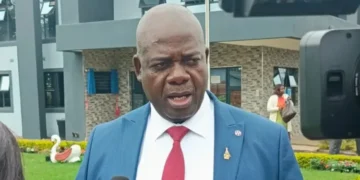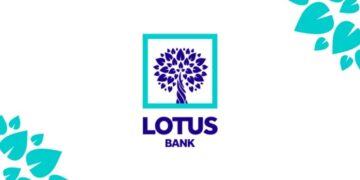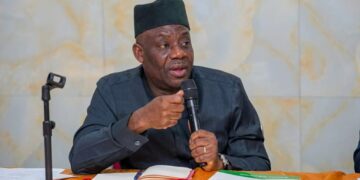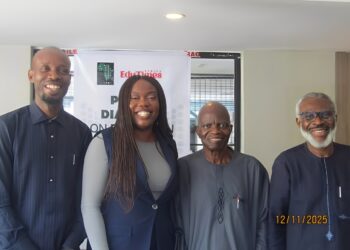
Your focus and expertise is particularly directed towards SMEs. What is the government of Ghana doing to drive entrepreneurship in Ghana? And two, what part can SMEs play to reduce poverty in Africa?
So the government of Ghana, I would say, has done quite well. They have brought in several initiatives to ensure SMEs are getting empowered. I know they have a national agenda to ensure businesses thrive. So there is The National Entrepreneurship and Innovation Programme (NEIP). This program’s focus is to support SMEs that are doing relatively well. There are some grants and short -term facilities to help the businesses grow. And they also help by using platforms like my own and other platforms to train and build capacity in these young businesses in the start-up stage. I know there is also the Ghana Enterprise Agency. Yes, GEA and their focus has also been very good. They realigned a lot of small businesses to grow and they’ve partnered quite a number of developmental agencies to get funding, grants and also to build capacity in budding businesses.
So I think these are the two things that I think the government is really doing well with to drive SMEs. And there is, I believe, a national agenda to actually make sure small businesses thrive.
However, on my own side and on the side of individuals, like I said earlier on, leaders should not only identify problems, but they should find solutions to these problems. So during my years of banking, one of the key things I observed was that small businesses always have a challenge in securing funds or money. It is usually tough because the systems, the basic structures are not in place for these SMEs, which makes it quite difficult to grant their financial needs due to the risk associated with them.
There is no bookkeeping, there is no management competence. So you’re asking yourself, if I give money to this person, how will the money be used in a way that would ensure I get my money back.

Once there is a question mark there, there is no way we can let you have the money because that money is somebody’s money. And we need to turn it around for the money to come back. So I realized that there was a critical angle that needed to be looked at. Of course, in Africa and even internationally, it has been said that SMEs are the major drivers of every economy. The private sector contributes significantly to the development of economies. Hence, we cannot overlook the fact that SMEs play a critical role in every developing country. However, the point is, how do we get these SMEs to play the pivotal role they ought to play? Systems, structure, advisory services, implementation of these systems have to be put in place. And that is why Tarragon Edge was formed.
I am especially skewed towards women because one of the key SDGs that we stand for as a business is SDG5. And it’s about women and gender equality. But, we also stand for economic development in general, which is SDG8.
So my point is, how then do we relate the issues we identify as leaders to the solutions we can offer? How then as an individual, do I relate to what I saw while working in the bank and how can I help? With regards to the SME problem, how can I help solve them? And that is why the advisory services for building capacity in SMEs was formed. But the question is, are they also making themselves available? Is it just about looking for money? Because once you get the money, you need to pay it back. So, once you don’t know how to turn the money around and make the money come back, there is a problem. So first of all, small businesses should understand that they have a serious and critical role to play in communities, in societies, and in our nations. The second point is that we need to be ready. We need to know that it’s not just about starting a business, we need to scale up the business and we need to sustain it too.
How do we scale up our business? Human capital is essential. Getting the right human capital to work with is a challenge everywhere. But we can always get one out of 10 to be good, and then we can groom others gradually, here we talk about …succession planning.
As an SME leader or business leader/entrepreneur you need to understand that it’s not just about having a vision to run a business, there are a few critical points that need to be put in place. Customer centricity is one. You must understand that you will need to leave one day so must show the way that others will follow. Thereby, building a succession plan, so that tomorrow when you are not there, the business can still exist. Don’t build a business around just you.

Another thing is to put the basic systems and structures in place. Have a bookkeeping system, record keeping and have a management board. Governance is of importance wherever you find yourself in business. So the governance structure is important. Now, we are all talking ESG, environmental, social and governance. Don’t be a business person that is focused on only your profitability, but also be focused on the environment, be focused on society. That’s the impact.
Do not just tick the box that I have provided 10 boxes of sanitary pads to a hospital ward, or I have supplied tables and chairs to a school. No, that is not the type of CSR we are talking about. CSR is impactful, great, but we need more than that. Guide and build capacity in your team members, so that they can also continue the business when you are not there. That is a succession plan. That is part of societal impact.
Another thing is to make sure that you are investor ready so that when the opportunity comes for your business to scale up, investors are ever prepared to support you. Banks are ever prepared to support you because they know what you are made of. They know you have the competence as a leader to manage it and bring it back.
And the last thing is in terms of governance. No matter how small your business is, my advice is that you at least put together a small board. A board that oversees the activities of your businesses. Once small businesses have adopted these simple things I’m talking about, I’m sure the role that we play in the nation, and across Africa, would go a long way to positively impact our economies better.
Now, connecting poverty alleviation to SMEs, the point is that we must know that we are actually a critical player in terms of building economies. By creating jobs and making sure our businesses are sustainable, we can drastically reduce poverty in our society.
It is very important for us to scale up our businesses. Yes, the first three years of every business is always tough but once you go past those first three years, you must then scale up and grow. You need to actually go through the product life cycle, the business life cycle, and make sure that you are becoming sustainable. Sustainability to me is taking a break, leaving, doing other things and somebody takes over seamlessly. Sustainability to me is growing across Ghana, being in Nigeria, Rwanda or any part of Africa and even going beyond. Sustainability to me is not just providing jobs, but making sure that it goes beyond me. Succession planning has to be done. The business grows and becomes a global business because we are in a global environment. So I’m here in Ghana and I’m collaborating with somebody in Nigeria. Or I’m here and I’m collaborating with somebody in Rwanda or the UK. Hence my businesses are all over, but for me to be among the SMEs that are helping to alleviate poverty, I have to first put in the right systems, put in the right structures, and go beyond my local or geographical area.
Tell us about your initiatives to increase entrepreneurship amongst women in particular. What is “Who Moved My Heels” all about?
So with my initiatives, one of the key things I stand by, is technical and skill training. And when it comes to entrepreneurship, we are not all the same. Some of us don’t have the grit, because for entrepreneurship, you need grit and gravitas to be able to soldier through. Some of us just don’t have the resilient nature to go through it. It’s tough because at the end of the month, whether we’ve made money or not, we need to pay our employees. And so entrepreneurship is not for everyone. That is the first point that I want to make. However, to own a percent in a million-dollar company is better than to own huge businesses that amount to nothing. My advice always is, if you identify 10 people who are very good in terms of having what it takes to succeed and 50 of us can partner or support them to make sure they do well, then that is the way to go. Here, I mean let’s see more collaborations. That is one aspect.

The next aspect is that I think right from school and through the educational system, we need to start teaching people that they can actually have it all, meaning they can work for someone and still be an entrepreneur. You can work within an organization and still own your own private business on the side. And that doesn’t make you a full -time entrepreneur, but you’re solving problems because you’ve identified some issues that you are trying to solve. Another thing is that I think we’ve all learnt from global leaders. Businesses are not built in one day. Steve Jobs, may he continue to rest in peace, this is someone whose story most of us know. We know how at a point he had to exit his own company that he had built.
But he was brought back because there was none like him. He had made a mark as a leader and as an entrepreneur. He solved problems. He provided a solution that no one else could easily get done. So, once you’ve identified that this is what you want to do as an entrepreneur, this is what you want to do as a business person, you have the required competence, you have the passion, you’ve got the right people on board and you’re doing it well, the next thing is for you to build up other people. Today, Steve Jobs is gone, but at least Cook and the others he left behind have taken the business up. And that is why I keep hammering on the need to build a succession plan as a leader or as a business person. If Steve Jobs had not done that, now that he’s gone, there may have been no Apple.
These are some of the things we need to do if we want entrepreneurship to thrive.
- We need to build capacity in our team members.
- We need to ensure that there is collaboration.
- We need to replace competition with collaboration.
You might be very good at something. I might not be too good at it, but I have the money. I should be ever willing to support you if I believe in your dream. So that when the company becomes big, at least I own a little, I own some shares in it. If I’m not there tomorrow, my son, Jaden, who is eight years old, can take over. And once I have built that mindset in him, he can run with it. I think to build more entrepreneurs, we need to start it from the home. I learnt entrepreneurship from home. My mother was not doing one thing. She was doing two or three different things. I am not advocating being a Jack of all trades and master of none, no.
However, I believe that you can be Jack of all trades and master of all. It depends on your focus. It depends on your resilience. And it depends on your commitment towards whatever you are doing. So I, Genevieve, I’m a trainer now. I do a lot of training. I teach people. I’m a public speaker. But it hasn’t taken me away from my core area. I’m a banker by profession. So any day, anytime, if you put me in a banking suit, I will still fit. When you put me in the classroom to teach, I can teach. When you ask me to write, I can write. When you ask me to do public speaking, I can do public speaking. When you ask me to sew, I cannot sew because I have not acquired the skill to sew. Is this something I am attracted to? If I am, then I will start learning. If I’m not and I see that Joseph, who is my staff, is very good at sewing, I can hire his services to do it. So if I like my friend’s hat and want to start making it as a business, knowing that I don’t have the skills to do it, I can get Joseph to do it. All I need to do is support Joseph’s business, invest in him, so we can export it even beyond Nigeria and Ghana. We can get people who love African or cosmopolitan dressing to go afrocentric and buy it, and that is money. Joseph makes money and Genevieve gets a share. And that’s how to go. And that’s how to grow more entrepreneurs. This sort of collaboration is critical.

Who Moved my Heels?
‘Who Moved My Heels’ is actually a book that was written by 18 women across the globe. So Genevieve is one of them from Ghana. Dr. Abena is also from Ghana. There is Dr. Nush. There is Dr. Aloysia. I can’t remember all the names, but there are women from South Africa, from the U.S, from Dubai, from Kenya and from across the globe. And why did we put this book together? We put this book together because we realized that a lot of women are going through a lot, but not just women. Businesspeople. But entrepreneurship, like I started by saying, requires certain characteristics and attributes.
One is resilience. Another is the ability to remain focused and committed against all odds. It’s not an easy journey and it is not everybody who can succeed as an entrepreneur. But we realize that no matter what, there is always something that comes naturally to us as women. So, I started a catering business many years ago, while I was a banker. And then I realized that, okay, I love to see good food. I love to see nice pastries and stuff. But I don’t have the time. So how can I do it? I decided to employ some people to do it. Unfortunately, they ran it down. Yes, definitely I’m human, so it got to me that they wasted my money and all that. But did I give up? No. I tried another passion. I opened a gift shop because I love to see nice things. I love to see beautiful things around my space. I love to see decorated places. My space should always look good. I love small but beautiful things. So I opened a gift shop. What happened? It was also run down. Did I give up? No. When I was deciding at a point that I would exit banking and not do a full time job for a while, I had a plan. I wanted to be a trainer. So I started educating myself. I started becoming somebody who would be able to teach in the classroom, somebody who can teach high profile people, somebody who can teach leaders, somebody who can teach just about anybody. So what did I do? I prepared myself.
Who Moved My Heels hills has different stories, but I’ll talk about my story. My story was about the Entrepreneurial Wheel. Your wheel of life is basically every aspect of your life that’s put together and how you, as a person, prioritize it. For instance, my personal wheel of life would have my education, my career, my societal activities, my family life, my spiritual life and my financial life. That’s my wheel of life as a person. Yours might be different because you have different focus areas.

In this book, I wrote about an entrepreneur’s wheel of life, which identifies the different phases and changes that come along as you go on that entrepreneurial journey. There will be hard times, there will be really tough times, there will be challenging times, but I see all these phases as experiences. They are not drawbacks. They are experiences that you go through to be able to re-focus, realign, re-strategize, develop and move to the next level. So yes, I started by saying that I started two businesses that went down within three years. But did I give up? Who moved my heels? How did I feel about needing to get back? You know how good and extraordinary we women look, when we stand on our high heels. So, Who Moved My Heels is just an analogy of when a woman is wearing a pair of high heels and it is removed. She becomes flat. When it is removed, you drop in height and in a way you feel. Down. Whenever I’m wearing heels, the way I walk is calculated and deliberate. I walk with some finesse. However, when I’m in a pair of flat shoes, my walk is different. Like I’ve been pushed. So Who Moved My Heels is simply saying that when your heels are moved, it brings you back to ground zero. So who or what moved it? It can be challenges or some experiences. There can be financial constraints. It can be people. It can be a variety of factors. However, when it was removed, did you just leave it there or did you bounce back? So basically, Who Moved My heels brings stories from 18 different entrepreneurs who tell you why they decided to go back. Some tell you why at a point they had to give up but that single motivator of wanting to see themselves standing tall again moved them, hence we decide not to stay down but pick ourselves up and move ahead.
So my story is just about the entrepreneurial wheel and I spoke about different phases of the entrepreneurial journey and some of the key things that you should have as an entrepreneur but I also didn’t forget the importance of human resource/people management. Talking from experience, people are one critical aspect, because that is what collapsed my two side businesses. And so now, how do I identify the best team members to work with? How am I sure that the way I am going is the best way for me? How do I delegate so that I get the best people in my team to continue the job for me? Because if I’m working at the bank, my time is already taken, most times 100%. 70% will go into the bank and 30% to other things. Here, whilst I’m away from the business, have I groomed other people who can handle the business just as I would have if I was there? So those are the things that I spoke about and also the fact that no matter how challenging the journey is, once you are passionate, once you are resilient, once you have the commitment and the focus, the grit and the gravitas, I’m sure you would excel in it no matter what. So that’s how my story was in the book WHO MOVED MY HEELS .
You were on a work-related trip to Nigeria recently. Does that mean your initiatives extend beyond the shores of Ghana? Do you have an African focus or a purely Ghanaian one?
I will say that I don’t even have just an African focus. I have a global focus. My focus is global. I believe that you work local, but you think global. I’m a Ghanaian. I’m an African. But first, I must secure the grounds in my nation. I have to make sure that my impact is being felt locally. Then I move across to other nations as well. I move to Nigeria, Rwanda, Kenya, and other parts of Africa. Then, I go international. That is how I think. And that’s how every human being, every leader should think. Think beyond your local jurisdiction. Therefore, in answering your question, I would say that yes, recently I was in Nigeria and I was at the microfinance summit. There was a conference for Nigerian microfinance banks. I had to come and moderate a session on ESG. I’m a sustainability focused person. So whatever I do, sustainability is very critical to me. That is why I was called upon to come moderate and speak on SDG5 and to also help redirect our focus a bit to women-centered products in the banking industry and in the financial industry in general. And here, I’ll say that collaboration like I said earlier is key. I live in Ghana but was invited to Nigeria. This happened because I had an opportunity to be on a session at the Financial Inclusion Microfinance Africa virtual summit in July where I moderated and one of these people on the panel, I moderated (Joshua Ukute), apparently the president of the association extended the invitation. So probably based on how I moderated, it caught his attention and he realized that, oh, I can tap into Genevieve’s knowledge base and so it happened.
I would say that for me we are Africans. It’s one small world, but we are thinking beyond Africa. So whatever initiative I come up with, be it financial empowerment of women or youth leadership, I don’t just think Ghana. I go beyond Ghana. I have a project I call Beyond the Certificates. This project is actually centered on young people in universities, tertiary institutions.
And I have done it in different countries. Although I have done more in Ghana since that is my base. I have also given the right to other people to run it in their own countries. And I think that is how we should think as leaders. So, when you have an initiative and it’s good, you look for collaborators across other jurisdictions and then you can run the same things there. When it comes to building capacity in women, how did I get a footing into other countries like Nigeria, Kenya, Rwanda, and the UAE? The UAE is not even part of Africa, but I have a greater footing there because I have built capacity in a lot of women-owned businesses there. And I think that is how every leader should think.
Think globally even if you work locally. I started the Beyond Certificate initiative in 2018 but I was focused more on all the tertiary institutions. I had a network called the Tarragon Edge Students Network, where I focused on internship opportunities for these young ones, career guidance and counseling, mentorship coaching and giving them space to work.
Because when we attended university, organisations used to come and recruit us before we finished school. But now that isn’t there anymore. And also, it is because a lot of young people feel entitled. So they think once they are done, they will get jobs while the jobs are just not there! Hence one needs to be very conscious and make very deliberate decisions. You need to stand out in order to be seen. So, how do we bring in some of the things that work outside? In the US, people are in school at 17 years or 18 years and when they are on vacation, they come and work at Costco or at Walmart. They work at all these different places just to build their interpersonal skills, their communication skills, learn time management and little things that help them beyond your certificate.
So, the whole idea behind Beyond the Certificate is that there is so much more that young people need to know and learn. And once you are able to get these things into your mind, it shapes you better. I’ll say it makes you excel and it makes you become outstanding in your field of work. So that is why Beyond the Certificate is very close to my heart in terms of youth development. And I am even looking for more collaborators, of course. I want more people to come and run with it.
You have been listed as one of the 100 most impactful change makers in Africa by Humanitarian Awards Global 2023, and listed among the 40 most influential female leaders in Ghana in 2020. In addition, you have won several awards, both in banking and in leadership. Which one of these means the most to you and why?
Wow! I would first of all say all these awards are on a merit basis. And I love all of them. But I’ll say there are two that really touched me because of the stories around them. The first one was by Business Executive and it was in the banking space. I won this award in 2021 just after the COVID lockdown. And one of the questions I asked the organizers when I saw the mail in my inbox was, why me? It’s not that I’m underating myself but previous awardees had been CEOs of banks, directors of banks and so on. In response they said one, during COVID, you completed your doctorate. This was a tough period so that must have been quite challenging. Still during this difficult period of the COVID lockdown, you initiated two key projects – the WISE Network International in Ghana, where women are being built up and groomed to take up higher leadership roles in the corporate world and also at the national level. Still in the COVID era, you started the REKS Leadership Club. And in the same period, your banking work also peaked. You were delivering great service. So, during this challenging period that has seen some people withdraw and others have given up, you have stood the test of time. It has become your silver lining. You have excelled even in the midst of all these great challenges. Most bankers are not able to multitask so it’s beautiful to watch you, as young as you are. You might not be at the CEO level, but you’ve done so well. Nothing drew you back.
After all these comments, I’m like, oh wow. I didn’t even consider all these things that I’ve done. Because I wasn’t doing it with any ulterior agenda in mind. I was just doing it because I wanted to do it. And the last thing they said was, this same year, you also released your first book, The Jigsaw Effects of Leaders. This is where I spoke about so many things, including not thinking about leadership as a position because we should see it as something beyond that. It’s not a title. I mean, you can be a leader wherever you find yourself, even as little as a child at home. Although I’m not the first child, I started playing that leadership role right from childhood, when I was about 12 years. So I’m just trying to scope it and say that as young people, especially to the youth, we should not see leadership as waiting until we occupy a certain seat, waiting until we get into a position, waiting until we get some job that will put us on top. That’s not how we should see it. How do we see problems or identify problems and how are we willing to solve those problems? When we have a vision and we are pulling others along to run that vision; when we see the good in others and we are ready to groom them for the next level; when we are willing and able to sacrifice our own comfort and think of the comfort of those who are following us, our team members, our society, our communities and the people around us. As leaders, we should remember that we must first serve and that is how I want to see the whole leadership thing.
So when they put all these things together, honestly, I took the award with pride because I think many awards have become something else. So, I’m very particular about the awarding body, what is behind the story and why the selection of Genevieve. So these are some of the questions I asked, and I was really touched. That was the first one. The second one was called A Torch Bearer for Africa Women. And this was given to me in Kigali, Rwanda at the trade and investments summit in 2021. It was called the TARJ summit. I was a speaker at that conference and also an awardee. So who is a Touch Bearer? A Torch Bearer is somebody who holds a torch and is moving with it, but you’re not just moving with it. You’re moving with it with others behind you because they need to see and follow you. And so at a point, You will need to leave it for somebody else to continue. And so that also touched me because it recognised me as a leader who has a vision and who doesn’t just keep it to herself.
You see, leaders must decentralize their vision through communication. They must communicate the vision to their people, for them to understand that this is where they are heading towards. As a leader, I may be leading you, but it doesn’t mean that I know it all. I am leading you, but it doesn’t mean that I have all the answers. So in all of this, I must say that I cannot take all the credit. I must give credit to people who have groomed me, mentored me and ensured that I got to where I am today.
For instance, there is my former MD at Fidelity Bank who is also the co -founder of the bank and now the chairman of the board, Mr. Jim Baden. And then all the great people that I have encountered in my journey; my former bosses who saw the potential in me and groomed me to realise it. And above all, my parents. I mean, I can’t ever thank them enough because they saw the leadership trait in me from day one and they decided that no matter what, they would empower and support me. So today, one minute I’m here, the next minute I’m there, but my mother takes care of my son. And so the support system has been great and I cannot possibly thank them enough. So, if I have the opportunity to say thank you to people, there are many that I would thank. I must however single out my husband who has been great and also a few people around me who have coached me and are still coaching me. Eugenia, Dr. Abbey, Esther Asiedu-Larbi, Lady Naa Adorkor, Roland, Franklin Sowa. Infact, there are several of them. Fred Assamany, Michael Nartey,Derek, Uncle Ebo Essandoh, all the great entrepreneurs who have always done everything to make sure that Genevieve succeeds in whatever endeavor she takes up and supports me with all initiatives.I really appreciate all these people and I pray for such people and I advise that every leader should have a coach and a mentor, it’s important.
Fantastic, that is something that everybody needs to hear. I was going to say especially here in Nigeria but I think it’s everywhere. So that brings us to our final question which is; we are all running different races here on earth but for Dr Genevieve, what would be the definition of success?
Hmmm…. for Dr Genevieve, I can say I’m successful when I feel and I know that for sure I have impacted a lot of people. I know I have already impacted some but I think that there is still room for improvement. Impact, for me, is one of the key things that makes a leader an effective leader, especially when you are no longer around. Because, when you are way gone and your legacy is still being felt, when you are gone and all the things that you preached, you did, you managed, you led are still being done, then there in my grave I will know that I was successful and that I did well. So impact is the first thing.

The second thing for me would be self-actualisation. We are all running different races and I, for one, have an agenda and I believe I’m already on it. I thank God I identified my purpose on time. So I’m living my purpose. And what is that purpose? That purpose is to ensure that a lot more women are financially empowered. I use the word financially empowered because I believe that when I am empowered economically, then I will have what it takes to push things, to make things happen, to assist things, to turn things around. I can then make my husband, the head of my home, a bit more relaxed. He will not be overly stressed. I can support him. I can support my kids. I can even extend the support to outsiders who are not in my family circle. And that one is also part of impact. So, if I see a lot more women financially empowered, I think I will feel I’ve been successful, because it’s a journey I’ve been on and I’m still on.
The third thing is that I would want to see a lot of women in high leadership positions. When you look at the statistics, I see that it’s still less than 20%. We women are still not where we are supposed to be. And I don’t think it is because anybody is preventing us. But I think it is because a lot of women are too laid back. Even when we can speak, we don’t want to speak. We are thinking of society. When we can impact, we don’t want to. We are thinking of society. We are not even ready to collaborate. We are not ready to pull others along because we are thinking that they’ll come and overshadow us. So it’s an agenda that I am on and I am working on it, day in and day out. Trying to reiterate the fact that we are not in competition with you men, not at all. We are just there to support you. You are there to support us. The diversity makes it beautiful. So when I’m on the board and you are on the board and I bring my views and you bring yours, we look at things from a different angle. Men look at things from a different angle. So when we bring those thoughts together, it makes it beautiful. So I want a lot more women to understand it this way. It’s not a race, it’s not a fight, it’s not a competition. Instead, we should understand that it’s the diversity that makes it beautiful. Nothing should stop a woman from taking a leadership role if she can. But culturally, there are many issues; we know how it is. But when I see that at least the statistics are gradually improving, I will feel better. When I see maybe a year or two from now, that a lot of women are ready and I’m not talking about availability, I’m talking about readiness, I will be happy. Readiness means that we have prepared ourselves enough to grab opportunities when they come. So it’s not when the opportunity comes that we will now go and prepare ourselves. No, I don’t want that. A lot more women should be knowledge seeking. A lot more women should be ready to collaborate and groom other younger people to get to the pinnacle of their career. And for me, when these three things are looking better, I think I’ll boldly beat my chest and say Genevieve has been successful; because whatever dreams, whatever aspirations, whatever agenda, whatever my purpose is, I can tell that it has been fulfilled.
And then lastly, when I have a lot of cash…Lol, so I can enjoy it with my family. I love traveling, so when I can travel to the beautiful places that I want to visit without sweat, without thinking twice, and I can still take care of the students whose school fees I am paying and support different people here and there, then I can be happy and say yes, I have achieved what I want to as a person. Two, if I have impacted so that even if I’m not there tomorrow, all the plans, ideas and initiatives that I have incorporated keep running, I have a team of people who can run the WISE Network for Women, I have a team handling Tarragon network of students, I have people that I have mentored and I’m still mentoring, I have a succession plan that will ensure things continue seamlessly with or without Genevieve. That to me is success.
_____________________________
Dr. Genevieve Pearl is a multiple award winner in Banking, Leadership and a light bearer for African Women. A versatile international speaker and panel moderator. She is listed as one of the 100 most impactful change makers in Africa by Humanitarian Awards Global 2023, and listed amongst the 40 most influential female leaders in Ghana 2020.
She is a Customer Experience Strategist, Corporate Trainer and an SME consultant with great passion for gender financing and youth leadership. She is an Enthusiast of SDGs 5,7,8 and 17. She is currently the Lead Consultant of Tarragon Edge Limited. Prior to her new role, she worked with Fidelity Bank Ghana Limited were she managed flag ship branches and was known for her exceptional service delivery experience. Her expertise are in personal and team development, leadership, customer experience, partnership brokerage, writing and management consulting.
Dr. Genevieve is an alumnus of the Swiss Business School Zurich, Switzerland where she earned her Doctorate in Business Administration, and the University of Ghana, Legon where she had her Masters Degree and GIMPA for her Bachelors in Business Administration. She is also management certified by CEIBS, Shanghai, Cranfield Management – UK and Harvard, USA. She is a fellow of the Chartered Institute of Leadership and Governance, USA (Ghana Chapter)
Dr Genevieve is a columnist in the Business and Financial Times in Ghana, the Author of The Jigsaw Effect of Leaders and The Diary of the Branch Manager. She is also a co-author of Who moved my heels and My Africa, my Identity.
She enjoys sharing knowledge, writing, traveling and listening to good music.
LinkedIn: https://www.linkedin.com/in/genevieve-pearl-duncan-obuobi-fcilg-arb1-dba-364521139/
Instagram: https://www.instagram.com/gennypearl_/
Facebook: https://www.facebook.com/GennyPearlObuobi


















































































 EduTimes Africa, a product of Education Times Africa, is a magazine publication that aims to lend its support to close the yawning gap in Africa's educational development.
EduTimes Africa, a product of Education Times Africa, is a magazine publication that aims to lend its support to close the yawning gap in Africa's educational development.